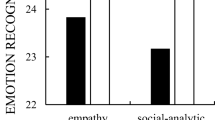Abstract
This study addresses the effects of gender upon the attributions of responsibility for success and failure by chief executives in an organizational setting. Prior laboratory studies verify that some sex-related differences exist, although their importance and causes have been subject to controversy. In general, gender seems to make a difference in two respects. Men tend to make stronger attributions to their own ability than women and men are less likely than women to attribute their own performance to luck. In short, women are more likely to derogate their own efforts than are men. In this study no major gender-related differences were found in the patterns of attribution of the causes given for success or failure. These results indicate that if a general model of gender-related attributional differences is to be developed, additional studies from natural settings are needed.
Similar content being viewed by others
References
Adams, J. B., Rice, R. W., & Instone, D. Follower attitudes toward women and judgments concerning performance by male and female leaders. Academy of Management Journal, 1984, 27, 636–643.
Adams, J. B., Adams, J., Rice, R. W., & Instone, D. Effects of perceived group effectiveness and group role on attributions of group performance. Journal of Applied Psychology, 1985, 15, 387–398.
Crombie, G. Women's attribution patterns and their relation to achievement: An examination of within sex differences. Sex Roles, 1983, 9, 1171–1181.
Deaux, K., & Emswiller, T. Explanations of successful performance on sex-linked tasks: What is skill for the male is luck for the female. Journal of Personality and Social Psychology, 1974, 29, 80–85.
Elig, T., & Frieze, I. Measuring causal attributions for success and failure. Journal of Personality and Social Psychology, 1979, 37, 621–634.
Frieze, I. H., Whitley, B. E., Hanusa, B. H., & McHugh, M. C. Assessing theoretical models for sex differences in causal attributions for success and failure. Sex Roles, 1982, 8, 333–343.
Garland, H., & Price, K. H. Attitudes toward women in management and attributions for their success and failure in a managerial position. Journal of Applied Social Psychology, 1977, 62, 29–33.
Heider, F. The psychology of interpersonal relations. New York: John Wiley & Sons, 1958.
Herman, R., & Heimovics, R. Effective Managers of Nonprofit Organizations. Research Forum, The Independent Sector, 1986a. Copy available from the authors.
Heimovics, R., & Herman, R. Attributions of successful and unsuccessful events in an organizational setting. Unpublished manuscript, 1986b. Copy available from the authors.
Kelley, H. H. Attribution theory in social psychology. In D. L. Vine (Ed.), Nebraska Symposium on Motivation, Vol. 15. Lincoln: Nebraska University Press, 1967.
Kelley, H. H., & Michela, J. F. Attribution theory and research. Annual Review of Psychology, 1980, 31, 457–501.
McClelland, D. O., Klemp, G., & Miron, D. Competency requirements of senior & mid-level positions in the department of state. Boston: McBer and Co., 1977.
McHugh, M. C., Frieze, I. H., & Hanusa, B. H. Attributions and sex differences in achievements: Problems and new perspective. Sex Roles, 1982, 8, 467–478.
Meinde, J. R., Eberlich, S. B., & Dieterich, J. M. The romance of leadership. Administrative Science Quarterly, 1985, 30, 78–102.
Moore, D. P. Evaluating in-role and out-of-role performers. Academy of Management Journal, 1984, 27, 603–618.
Osborn, R. N., & Vickers, W. M. Sex stereotypes: An artifact in leader behavior and subordinate satisfaction analyses. Academy of Management Journal, 1976, 19, 439–449.
Ross, M., & Fletcher, G. O. Attribution and social perception. In G. Lindzey & E. Aronson (Eds.), Handbook of social psychology, Vol. II. New York: Random House, 1985.
Salancik, G. R., & Meinde, J. R. Corporate attributions as strategic illusions of management control. Administrative Science Quarterly, 1984, 29, 238–254.
Tsui, A. S., & Gutek, B. A. A role set analysis of gender differences in performance, effective relationships, and career success of industrial middle managers. Academy of Management Journal, 1984, 27, 619–635.
Weiner, B. Achievement behavior and attribution theory. Morristwon, NJ: General Learning Press, 1974.
Weiner, B., Frieze, I., Kukla, A., Reed, L. Rest, S., & Rosenbaum, R. Perceiving the causes of success and failure. In E. E. Jones, D. E. Kanouse, H. H. Kelley, R. E. Nisbett, S. Valins, & B. Weiner (Eds.), Attribution: Perceiving the causes of behavior. New York: General Learning Press, 1971.
Wittig, M. A. Sex role norms and gender-related attainment values: Their role in attributions of success and failure. Sex Roles, 1985, 12, 1–13.
Zappert, L. T., & Weinstein, H. M. Sex differences in the impact of work on physical and psychological health. American Journal of Psychology, 1985, 142, 1174–1178.
Author information
Authors and Affiliations
Additional information
This research has been supported by grants from the Beistle Memorial Fund of the L. P. Cookingham Institute of Public Affairs and from the Weldon Spring Endowment Fund of the University of Missouri. We very much appreciate the cooperation and effort of all those who have made this project possible, including the chief executives who participated, our interviewers and raters, and especially graduate research assistants, William Grotts and Anne Rudigier.
Rights and permissions
About this article
Cite this article
Heimovics, R.D., Herman, R.D. Gender and the attributions of chief executive responsibility for successful or unsuccessful organizational outcomes. Sex Roles 18, 623–635 (1988). https://doi.org/10.1007/BF00287965
Issue Date:
DOI: https://doi.org/10.1007/BF00287965




